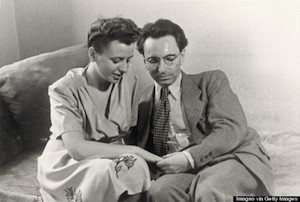Can the Science of Purpose Help Explain White Supremacy?
A sense of purpose makes us physically and psychologically stronger. But what if your purpose is hateful and destructive?
 Frankl and his wife Tilly before the war.
Frankl and his wife Tilly before the war.
It was for the Austrian psychiatrist Viktor Frankl when he was sent to the Auschwitz concentration camp in 1944. During his worst moments, Frankl would envision the face of his wife, which led him to this realization: “that love is the ultimate and the highest goal to which Man [sic] can aspire.”
Indeed, during his time at the camp, Frankl noticed that the prisoners who were able to see beyond themselves and help others often stood the greatest chance of day-to-day survival. His wife died in Bergen-Belsen, but Frankl went on to turn this personal insight into a lifelong effort to understand the role of meaning and purpose in human life.
I thought about Frankl as I watched video from Charlottesville, Virginia, of men (and some women) marching with torches and Confederate flags, chanting, “White lives matter,” “Blood and soil,” and “Jews will not replace us.” The specific goal of their march? To protect a statue of Robert E. Lee, the general who led Confederate forces in defense of slavery. These were the American descendants of the Nazis who imprisoned Frankl and killed his wife—and there is no doubt that they too share a strong sense of purpose, one embodied in their chants.
As a marcher told a Vice documentary team: “Last night, at the torch walk, there were hundreds and hundreds of us. People realized that they are not atomized individuals, they are part of a larger whole.” This “larger whole” killed one woman and seriously injureddozens of counter-protesters.
As part of a general movement in psychology to turn from studying human weakness to discovering what helps us to flourish, for almost two decades researchers have explored the questions Frankl raised in his work. Research suggests a commitment to goals bigger than yourself can strengthen your physical health and psychological well-being. But what if achieving your purpose must come at the expense of someone else? Today, what can the science of purpose teach us about the growing movement for white supremacy in America?
Purpose is intensely personal, say these studies, and yet it is shaped by the people who surround us. The nobility of our purpose often reflects the quality of the company we keep.
The psychology of purpose
“Purpose is absolutely a tricky concept, especially as it is possible to have a destructive purpose,” says Susan Mangan, a Ph.D. candidate at Claremont Graduate University who has studied purpose for years. “The definition of purpose does not require it to be altruistic.”
Indeed, a sense of purpose is defined by its inherent, profound subjectivity. According to Mangan and her advisor Kendall Bronk—one of the country’s leading researchers on purpose—purpose can be broken down into three components.
- It’s an ultimate goal that shapes your short-term choices and behavior.
- It is personally meaningful, coming from within. In other words, no one is standing over you forcing you to pursue your goal; you are self-motivated. The goal imbues your life with importance and value.
- Finally, a purpose in life goes beyond the self, leading you to want to make a difference in the world.
A fairly large body of scientific studies suggest that a sense of purpose evolved to drive us humans to accomplish big things. That may be why it has been linked to a lower risk of heart attack and a longer life: Evolution rewards those with a sense of purpose. Indeed, studies suggest that Frankl’s concentration-camp observations of who survived and who didn’t were probably accurate.
We thrive when we are working for some greater good. Some people find purpose in making others laugh, caring for the sick and injured, or just taking care of their families. Others want to protect the environment. Many people find purpose in religion—spreading the word of God, as Christians say. There may well be as many kinds of purpose as there are members of the human family.
The Nazis had a purpose as well. We can hear an echo of that time in the words of today’s white supremacists.
“When I joined America’s first neo-Nazi skinhead group, suddenly I felt like I could conquer the world,” says Christian Picciolini, co-founder of Life after Hate, in an Upworthy documentary. “I’d been kicked out of four high schools, one of them twice, and I met some individuals, and they promised me… that the bullies would go away, that my life would get better, that I’d have a family, and that I would have a sense of purpose.”
That purpose may well have brought good things to Picciolini’s individual life, at least for a little while. But what about the impact of his purpose on American society? Are all purposes created equal, or are some better than others?
The paradox of purpose
Here we must grapple with the paradox of purpose: It’s highly personal and subjective, and yet it always develops in a social context. People don’t get to vote on each other’s purpose, but people are socialized into meaning and purpose. Your purpose develops from the interaction of your psychology and our society, your individual experiences and our collective events, your opportunities and our limitations. When enough individuals share a common, meaningful goal, society can change. That gets back to what is probably the deep evolutionary purpose of purpose: It facilitates cooperation and helps us to achieve our greatest goals.
We shouldn’t be surprised if change entails conflict. In fact, we humans are often at cross-purposes. As our identities multiply, so do our groups—and we use our groups to apportion resources. When we don’t feel there’s enough to go around, we fight. On every continent around the world, it is considered noble to give up your life for your group—there is no higher purpose, by some lights. Indeed, that sacrifice is precisely what the statues of Confederate soldiers are intended to honor. To some, taking down reminders of the Confederacy seems to rob their sacrifice of meaning.
So, who is right? Let’s put aside that non-empirical, moral question, and instead focus on what psychological and social forces drive us to purpose.
The composite picture that emerges from decades of thinking and research, starting with Frankl and continuing to the present day with researchers like Bronk, suggests that a sense of purpose develops in tandem with our sense of identity. What kind of purpose children develop in life is shaped by the values and behaviors of the adults around them. For example, researchers like Jeffrey Froh and Robert Emmons have found that kids who learn to practice gratitude will be better able to see beyond themselves, a critical component in the young-adult search for purpose.
Is it possible that gratitude—and other prosocial behaviors like forgiveness—were missing from the childhoods of men and women who grow up to find purpose in white supremacy? Or perhaps their parents and teachers did foster a sense of connection with other people, but restricted it to white people? We can’t know for sure, from a scientific perspective. “There isn’t a whole lot of empirical research on ignoble purposes,” says Kendall Bronk, which she defines as antisocial or destructive. “This is an unfortunate oversight, but—as you might imagine—it’s a little tougher to get reliable participants and large enough study samples!”
Even so, Bronk wrote in an email to me, “I believe ignoble purposes likely are associated with some of the positive outcomes typically associated with prosocial purposes (e.g., sense of belonging, sense of direction, etc.), but unlike a more positive sense of purpose, they’re unlikely to be associated with other positive outcomes (e.g., humility and empathy).”
In fact, most white supremacists are perfectly capable of empathy and gratitude—but only for members of their own group. How do we know this? Because there is a huge amount of research that describes intergroup dynamics and the attitudes of in-group extremists like the marchers in Charlottesville. Children don’t just acquire a sense of purpose from adults. They also learn whose lives matter—and whose lives do not matter.
Studies of people who commit acts of terrorism and mass murder by researchers like Marc Sageman and Martha Crenshaw converge with wider research on intergroup conflict to reveal the roots of atrocities. It’s not individual-level dysfunction; there is no consistent psychological profile that predicts who will become a “terrorist.” Instead, researchers find the roots of group violence in the groups themselves. People with a strong sense of purpose kill for other people. They kill for their families, tribes, nations. They are part of groups that valorize aggression and deceit against outsiders.
Many of our political conflicts in the United States—as Charlottesville suggests—are really about who belongs in the group. Should we remember Robert E. Lee as American, or was he a traitor? Are the descendants of slaves American, or does each one need to produce a birth certificate, as President Trump demanded of President Obama? Are those two concepts of “American” mutually exclusive? These kinds of conflict create feelings of social uncertainty, where many Americans are not at all sure of who they are or where they belong.
In that kind of ambiguous, insecure situation, many cultural and social factors could interact with each other to warp the identity and purpose of each individual. When Americans (in contrast to some other cultures) continue to search for purpose in adulthood, after most people have supposedly found one, we tend to become unhappy and desperate. For young and older adults who have failed to find their own purpose, like Christian Picciolini, white supremacy could be an appealing alternative. People also find meaning in work. If they feel cut off from meaningful work, they may be more likely to turn to in-group extremism as a way to make a difference in the world.
 A white nationalist demonstrator walks into Lee Park in Charlottesville, Va., Saturday, Aug. 12, 2017.© Steve Helber/Associated Press
A white nationalist demonstrator walks into Lee Park in Charlottesville, Va., Saturday, Aug. 12, 2017.© Steve Helber/Associated Press
Leadership matters, too. One of the roles of a leader is to articulate, clarify, communicate, and nurture a sense of purpose in a group. President Trump came up with a brilliant sense of purpose in his campaign slogan: “Make America Great Again.” Who could disagree with that?
The trouble, however, lies in how those words are defined by their context.
Start with “America.” Taken together with promotion of the “birther” conspiracy theory(that President Obama was not born a U.S. citizen), anti-Latino rhetoric, and anti-Muslim policies, the Trump administration has consistently tried to position some citizens as more American than others, fostering a sense of conflict among groups.
What about “great”? Is building a wall between the U.S. and Mexico a sign of greatness, or of fear? The next word, “again,” implies we need to get back to an earlier time—but what time is that? Does that refer to the period of Jim Crow and explicitly racist immigration laws? Or does it mean a return to the period of the 1960s, when Americans extended civil rights to disenfranchised citizens and sent human beings to the moon? As goals go, “great again” suffers from a lack of specificity—and splits Americans along fault lines of collective memory and identity.
It’s little wonder the people who marched with torches in Charlottesville wore “Make America Great Again” T-shirts and baseball caps—or that they felt free to march at all.
What is our common purpose?
Of course, this is all argumentative speculation. We can’t really know for sure why white supremacy, after decades in the shadows, is suddenly making a comeback. But we do know where white supremacy leads, as Frankl’s life and work attests.
He also reminds us that there is meaning—if not happiness—in opposing racism and violence. In this conflict, a sense of moral clarity is essential. We might choose to march, for a moment, in the shoes of people opposed to us and perhaps try to elicit the good from them, without for a moment compromising our sense of right and wrong, or yielding an inch of public space to their purpose.
“Human kindness can be found in all groups, even those which as a whole it would be easy to condemn,” writes Frankl. “The boundaries between groups overlapped and we must not try to simplify matters by saying that these men were angels and those were devils.”
Out of context, Frankl may seem to be letting people like the Nazis off the hook, but that is far from the truth. He was an implacable intellectual foe of the forces that killed his wife and put him through years of hell. His purpose was wider than simply destroying one group so that another might live. Rather, he sought to help all of us find the “angels” in each other and in ourselves. That, to his mind, is how we become great.

This is a confusing, demoralizing time for many Americans. But as Frankl argued, purpose can help us keep going, even in the bleakest of circumstances. So, what is your purpose? What is the company you keep, and how do the people you know shape and sustain your purpose? Are they a source of strength? Do you know what makes their lives meaningful? Do you share a purpose? Does your shared purpose make the world a better place?